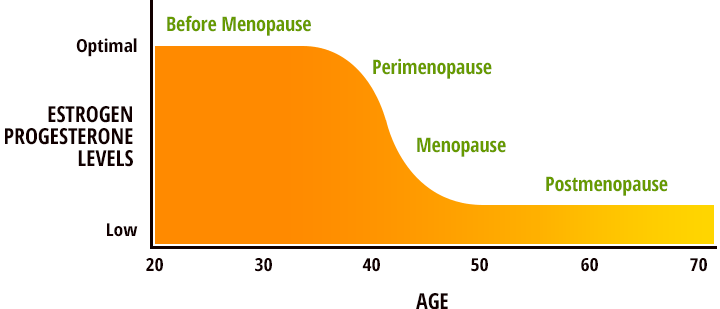Menopause is just part of the natural aging process, which affects all women. During menopause, your body undergoes significant transformations, driven largely by a shift in the levels of hormones like estrogen and progesterone.Each woman will transition through menopause in her own unique way. Symptoms may range from mild to severe, and some women even breeze through it unbothered, enjoying a new sense of freedom and energy.
There are many factors that influence the severity of menopausal symptoms, including genetics, diet, lifestyle, stress levels, your overall health status, and the use of some prescription drugs.
The 3 Stages of the Menopause Transition
The average age of menopause for women in the U.S. is 51, and most women reach this stage somewhere between the ages of 45 and 55. Perimenopause, the stage associated with the strongest symptoms, can start up to 10 years before menopause. Women are considered to have reached menopause once they’ve gone 12 consecutive months without a menstrual period, and from that moment onwards, women are considered postmenopausal.

| Perimenopause | Menopause | Postmenopause | |
|---|---|---|---|
| Definition | The transition towards menopause begins | Only happens after going 12 months without a period | From the day of menopause onwards |
| Average Age | Usually starts around the early 40s | 51 | Usually starts around the early 50s |
| Span | From 6 months to 10 years | One day | For the rest of a woman’s life |
| Periods | Still present, but very likely irregular and less frequent | None | None |
| Hormones | Wild fluctuations, especially of estrogen and progesterone | Levels continue to drop, but at a steadier rate | Estrogen and other hormones reach their low levels |
| Symptoms | Intense | Mild to intense | None to mild |
The Role of Hormones during Menopause
Hormones play a role in nearly every aspect of the body’s daily functions – their effects span from sex drive, menstruation, and pregnancy to metabolism, bone health, and even mood regulation.
Aging impacts hormonal health. The different hormone-producing glands – such as the thyroid gland, ovaries, and adrenals – progressively become less efficient and slow down their output. As women approach menopause, levels of estrogen and progesterone in particular begin to descend, eventually leading to a level where menstruation and reproductive function cease altogether.
As a result of these changes, women can experience a variety of symptoms. Among the most common are hot flashes, night sweats, dizziness, weight gain, anxiety, mood swings, hair loss, and sore joints.

Macafem Restores Hormonal Balance
By nourishing and strengthening the endocrine system as a whole, Macafem encourages the body to balance its hormone production and slows down the aging process. Balanced hormone levels mean women can feel invigorated, youthful, and able to live life to the fullest.
Macafem is a safe and effective supplement that helps alleviate menopause symptoms and other hormonal disorders, working to promote healthier bodies and happier lives.
Learn more about how Macafem works.
Symptoms of Menopause
The symptoms of menopause are caused by a decline in hormone levels, which begins during perimenopause. On an individual basis, these changes can be appear quite differently, but most women will some degree of discomfort during this time of life.
During the whole transition, common menopause symptoms include: